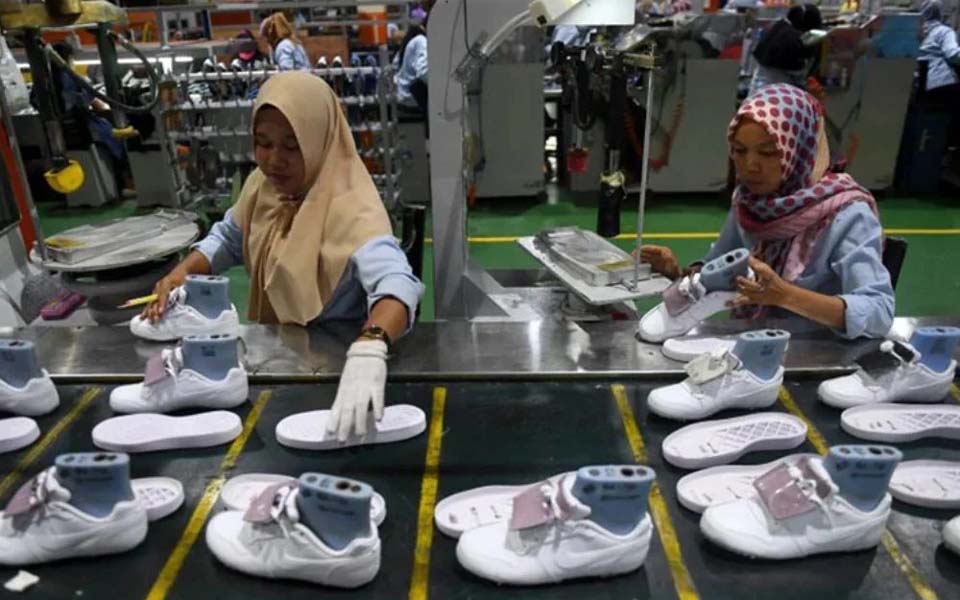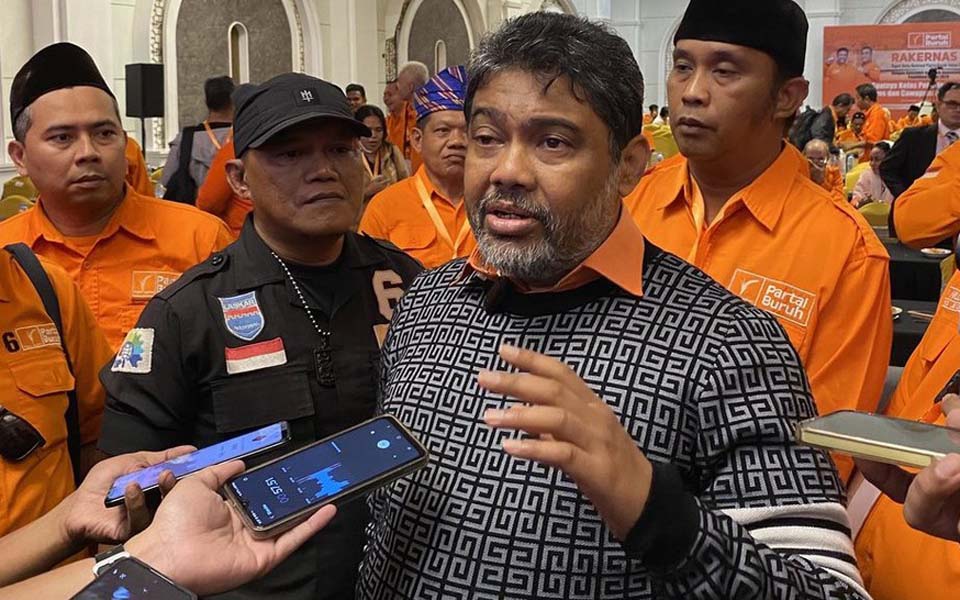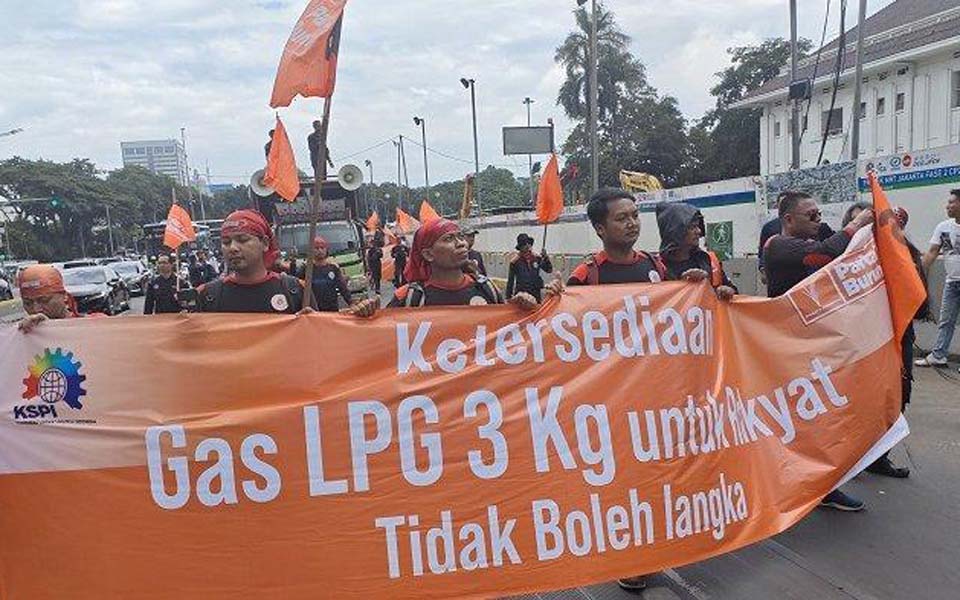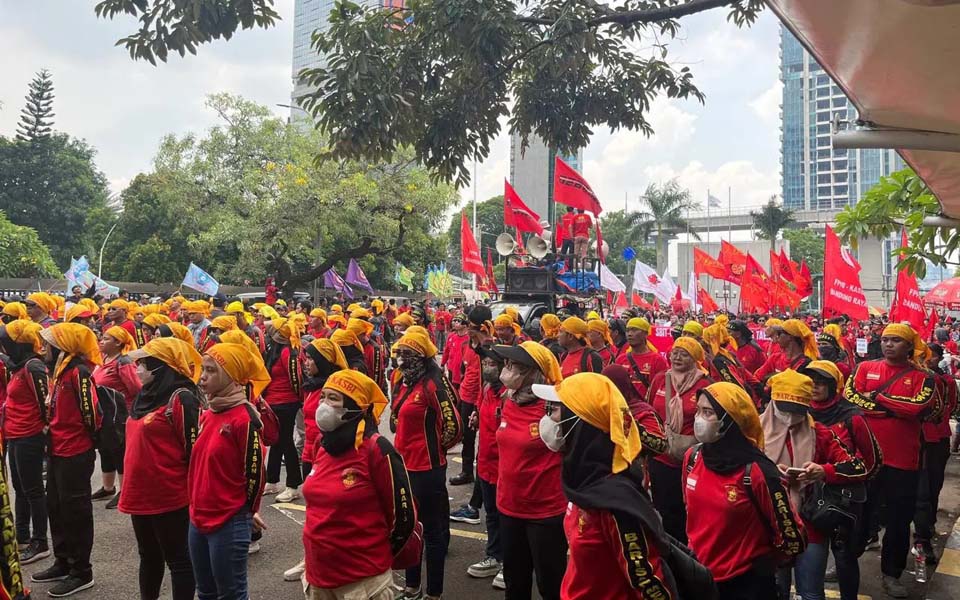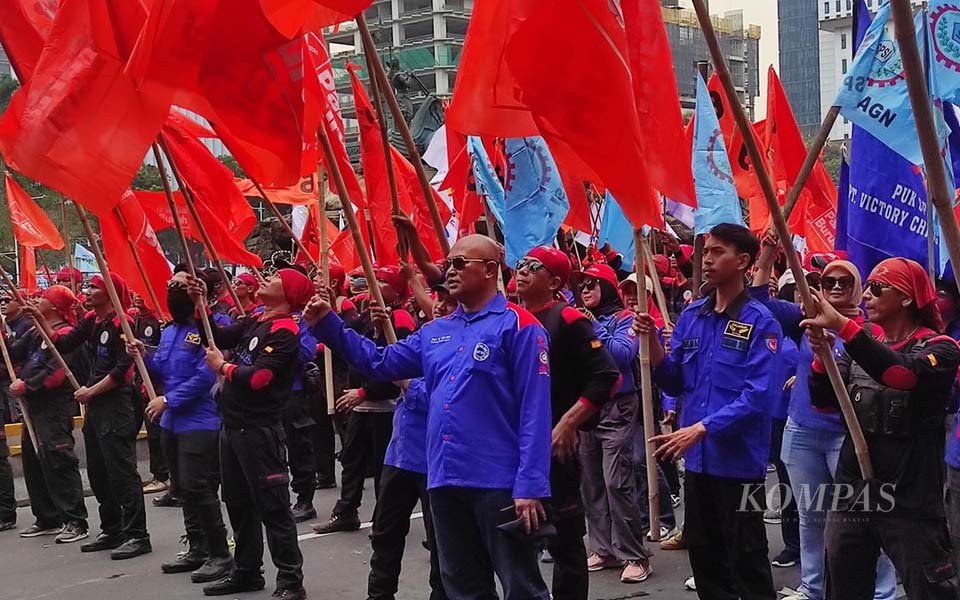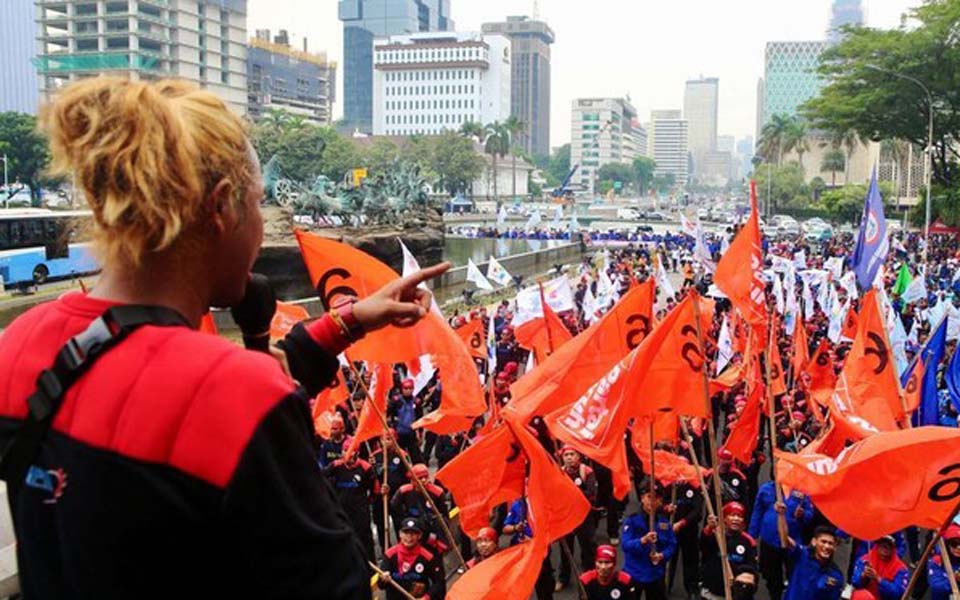Sherr Rinn – Between 2010-12 there was an awakening of the Indonesian labour movement that can be seen in the writings of people such as Danial Indrakusuma, Rahmat, Tarikh, Hidayah and Rekomendasi. These advances can also be seen from increasing unity within the Indonesian Trade Union Council (MPBI), huge national mobilisations and nationwide economic victories.
These gains at the national level were backed by the movement on the ground. In this case factory sweeps (geruduk pabrik, flying pickets where workers descend on factories en masse to provide solidarity or force factories to allow workers to join a rally) played a very important role.
The subsequent retreat of the labour movement at the national level – which began in late 2012 – can be more easily understood by being aware of what happened on the ground.
Factory sweeps mobilising mass solidarity at different factories took place between May and October 2012. It began with a rally opposing outsourcing at the company PT Hero Spk in late May and officially ended with the Declaration of Harmony in the Bekasi satellite city of Jakarta on November 8, 2012. The solidarity mobilisations peaked on September 29 at PT Patria when 10 thousand workers gathered in solidarity with outsourced workers at PT Patria.
In objective terms, Bekasi is the area with the largest pocket of workers and the biggest contributor of protesters in national actions. The retreat of the labour movement in Bekasi was very decisive and had a psychological effect on workers in other parts of the country.
In general the labour movement experienced a retreat, not just because of the Declaration of Harmony, but more so as a consequence of the dialectic between internal and external factors. Trade unions suffered an internal defeat in failing to defeat the counter attack launched by employers.
Examples of employer attacks
1. Offering concession that divide workers based on employment status
Factory sweeps usually ended with a joint agreement in which outsourced workers were promoted to contract or permanent workers based on their length of employment. An example of this was a joint agreement with the publishing company PT Gramedia in which workers who had been employed for 18 months or more were given Permanent Employment Contracts (PKWTT)[1], while workers who had been employed for less than 18 months were given three month Temporary Employment Contracts (PKWT). Less than 50 percent of workers were promoted to permanent employees.
As a result, PT Gramedia workers were divided between permanent and contract employees which affected solidarity and undermined worker moral. Moreover the company enticed contract workers (ex-outsourced) with severance packages of 5 million rupiah (around US$500) as compensation for workers who decided to resign early. But what could be done. Workers thought that instead of working for three months for an accumulated pay packet of around 5 million rupiah, it would be better to quit now and pocket the money. As a consequence, trade union membership declined.
Another example of this was at the food and beverage company PT Tirta Alam Segar (TAS) which produces Ale-Ale, where trade union membership declined from 700 workers to 400 after workers ended their term of employment. This was a consequence of a joint agreement to promote outsourced workers based on their length of employment.
Usually, workers that have been promoted to permanent employees are reluctant to defend their co-workers because they feel their positions are secure. They also feel there is no avenue under legislation to fight for co-workers who are still contract workers[2]. This method has proven very effective in undermining worker solidarity, particularly when a majority of workers only joined a trade union in order to become permanent employees[3]. Most trade unions also fail provide class conscious education to workers so they do not think of themselves as part of the same class.
The promotion of outsourced workers to permanent employees based on length of employment is also very detrimental. Lengths of employment vary from three months to 12 months, 18 months, three years and even five years.
Yet Another example was the case of a joint agreement with PT Bumi Kaya Steel Industries, which made a deal with workers that can be summarised by the following points: (1) Workers who had been employed for one year or more were given permanent employment contracts; (2) workers who had been employed for less than a year were given temporary employment contracts and would be promoted to permanent employees after working for one year; (3) if the first party (the company) violated the agreement, then it was obliged to pay a fines of 100 million rupiah per day[4].
The PT Bumi Kaya joint agreement was very rare, and is the only one of its kind[5]. This was the best kind of joint agreement because it did not provide a loophole for the company to divide workers based on their length of employment, and at the same time minimised the possibility of the kinds of violations often committed by employers.
2. The Declaration of Harmony
The Declaration of Harmony on November 8, 2012 was attended by employer groups (the Bekasi Investors Forum), provincial and regency government representatives, ormas (mass or social organisations, often with a negative connotation) and trade unions. The trade unions were represented by the Bekasi regency branch consulate of the Indonesian Metal Trade Workers Federation (FSPMI) led by Obon Tabroni, and the chairperson of the Bekasi All-Indonesia Workers Union (SPSI) regional leadership board, Abdullah. The declaration included six points including an end to factory sweeps, upholding labour laws and the establishment of joint coordinating posts to resolve labour issues.
In terms of the fight for economic gains, the agreement to uphold labour laws was in accordance with labour demands related to normative issues[6]. Employers, along with hired preman (street thugs) disguised as ormas members committed violations as demonstrated on the evening after the declaration was signed, when a group of preman attacked a labour coordination post setup at the HGW Chemicals factory.
The declaration was also used by ormas such as the Bekasi Social Movement (MBB) and the Indonesian Marginalized People Movement (GMBI, a pro-nationalist group involved in protection rackets) to ban factory sweeps. This also occurred with the motorcycles company PT Yohzu in July 2013 where the FSPMI and other trade unions attempted to carry out factory sweeps.
The Bekasi district police (Polres) also tightened up requirements for permits to demonstrate, despite the fact that Law Number 9/1998 states that demonstrations do not require a permit, only that the police should be notified beforehand. The Bekasi district police however made things difficult by refusing to sign letters of notification. Trade unions overcome this by sending the notifications by mail.
3. Thuggery
The use of paid preman has long been an obstacle for the labour movement as a result of capitalism which always produces a reserve labour force. In the context of factory sweeps in Bekasi, thuggery become widespread after FSPMI members at the aluminum casting company PT Enkei opposed preman from Ambon operating at the Central Market. The incident began when the FSPMI opened a shop-house at the Cikarang Central Market not far from the East Jakarta Industrial Park (EJIP) and refused to pay “security fees” to preman operating at the market. Central Market parking officials also often asked for additional parking fees from the hundreds of workers that frequently held consolidation meetings at the Enkei shop house. Workers refused to pay this.
The preman began harassing the works culminating in the beating of a trade union official. Workers responded by assaulting one of the preman in retribution. On August 18, 2022 hundreds of people gathered near the Enkei factory with a procession of workers marching through the Central Market towards the workers’ housing complex in the EJIP area. A clash between workers and the preman broke out at the market, although it was eventually brought under control.
That evening, the workers left the housing complex under instructions not to wear clothing or symbols identifying them as workers so they would not be interfered with in the streets. The instruction, which should only have applied to workers at the workers’ housing complex, spread widely and was not withdrawn for two days.
The trade union leadership refused to take the issue any further on the grounds that it was not a problem of industrial relations but rather a personal problem of the workers who carried out the assault on the preman. Three workers were subsequently jailed while police took no legal action against the preman. The Enkei Work Unit Leadership was obliged to pay a large compensation to the Central Market and the preman.
Also near the Central Market, workers from the company PT Surya Technology Industries (STI) were fighting to abolish outsourcing. The company employed preman from the Central Market to intimidate workers. No instructions to support the workers were issued resulting in trade union officials becoming afraid and the movement stalling. Trade union officials and members were then dismissed to the point that there were none were left. No further news was heard although occasionally former STI workers visit the worker housing complex.
After the STI defeat, many factories began employing preman for security services. Ormas with new names, but still made up of preman, began to emerge. A number of established players such as the Siliwangi Children’s Initiative Front Alliance (Gibas), the Pancasila Youth (PP) and the Association of Regional Sons (Ikapud), established alliances with groups such as the Bekasi Social Movement (MBB), which operated in the Jababeka industrial zone in Bekasi, and the Social Concern for Investors (MPI), which operated in the Bekasi MM2100 industrial zone of Cibitung. There were frequent clashes between these groups over control of factory waste businesses.
In the Jababeka area, PT Fregoglas (which produces fridges for Coca Cola) uses 20 or so Gibas preman at each shift, PT Starlink employs three ethnic Ambon people as security guards and PT Yohzu uses preman from the GMBI. The use of preman has become a general trend among employer groups led by PT Samsung.[7] Often, cases involving thuggery are not known about because workers are afraid to report them. These preman also often threaten the safety of workers and their families.
Trade union leaders are also threatened by preman. A group of preman once came to the trade union office and threatened all of the officials resulting in a case they were dealing with at the time being lost. It was in fact the trade union leaders who forced members to take severance. This was one of the explanations of why solidarity instructions became stuck.
These ormas also take advantage of conflicts between workers and employers, sometimes pretending to side with workers. According to claims by one trade union leader, ormas leaders are often acquainted with and quite familiar with trade union leaders. They often promise to support workers but in the end its money from the employers that speaks the loudest. They are sure to support the employers because they receive quite large payments.
The strength of these thug mobilisations is around 100-400 people. Reportedly, the young men who are mobilised are unemployed youths who are paid 30,000-40,000 rupiah. Of course the ones who benefit most are the leaders of the preman who mobilise them. The emergence of thuggery cannot be separated from social conditions around the industrial estate where people are poor and unemployed. Local people work as petty traders, motorcycle taxi drivers, labourers and waste scavengers. They are forced live on the periphery in slum conditions. A view that is quite striking is the large brick houses standing among small slum dwellings. Usually the brick houses belong to the owners of waste businesses. It is a social situation that is fertile ground for criminal activities.
4. Joint agreement violations
After the legitimisation of the Declaration of Harmony and the use of preman, employers were free to violate joint agreements (PB) with workers. They also employed shady lawyers, several of which were from trade union groups that had crossed over to the employers’ side. Such as in the case of PT Frigoglas, where it was agreed that workers who had been employed for three months or more would be promoted to permanent workers. The agreement was violated and some 90 workers sacked. Violations of joint agreements became rife and were carried out by employers by conducting mass sackings of trade unions members.
Usually employers justify these sackings on the grounds that orders have declined, or a rationalisation of the workforce. But these justifications are false because those who are sacked are invariably the leaders and members of trade unions – a form of concealed union busting.
What was even more painful was a case that triggered the All Indonesia Workers Union Communication and Information Forum (FKI SPSI) splitting away from the Confederation of the All-Indonesian Workers Union (KSPSI). When workers were sweeping a factory, the FKI SPSI (a kind of progressive wing of the SPSI) was fighting for the release of around 21 thousand workers from the status of outsourced labour.
One of its branch leaders however, maneuvered so that the results of the joint agreements, which was being monitored by the FKI SPSI, was not acknowledged. They issued a circular addressed to the employer, the contents of which stated that the joint agreements signed by the FKI were illegitimate because the FKI is not an official part of the SPSI. As a consequence, 75 percent of the workers failed to be released from the status of outsourced labour.
Labour movement’s response to attacks
Indeed, whenever the labour movement does takes a step forward, employers will launch a counterattack to push back these gains or even overturn the victory completely. What is more important than just understanding the employers’ attacks, is to understand the trade unions and labour movement’s response to this. From there, we can see the extent of the labour movement’s ability to fight.
The problem underlying the retreat of the labour movement in every place is the bureaucracy that straddles the movement. Right from the start, it was the bureaucracy that hampered the labour movement’s progress. Bureaucracy is not an element of an advanced labour movement. In the two instances of the revival of the labour movement, what the masses did bypassed this bureaucratism. And what bureaucratism does is to take advantage of the mass movement and fence it in for the benefit of the bureaucracy.
Here, the masses have not yet been able to break through this bureaucratism. The following are the bureaucratic policies that undermine mass resistance:
1. Controlling consolidation
Following an action on January 27, 2012, consolidation centres were established by the labour movement. These included the Workers House in the EJIP area, the Workers Hut in the Jababeka area and the FKI headquarters in Lemah Abang, Bekasi. The Workers House and Workers Hut, which were examples of places that harvesting the most new trade union members, show the pattern of bureaucratism that separates workers into their respective sectors and closes their minds to information from outside.
A great many workers registered to join the trade unions in 2012. On average, every day the Workers House could consolidate 1,000-2,000 workers. The workers were divided into group based on their factory of origin and consolidated by different trade union officials. Anyone who wanted to provide consolidation was allowed. Typically, the Cilegon Metal Workers Guard (Garda Metal Cilegon) often took part in providing consolidation.
A control policy was then issued by the branch management (PC). Only those appointed by the branch management were allowed to carry out consolidation and they held organiser training to recruit people to provide this consolidation. Unfortunately, the training was based on appointment by sector, not by voluntary registration. In practice however, some carried out their duties, others did not. Many of those who often used to provide consolidation were not allowed to do so anymore.
2. Solidarity actions blocked
Most of the trade union bureaucracy only accept solidarity actions and factory sweeps half-heartedly. Although an end to solidarity actions did not take place until the use of thuggery started to become widespread. Based on an interview with one worker (whose identity is secret), they said that the branch management would not allow solidarity actions to happen more than once. So even if a joint agreement was violated, solidarity actions were not allowed to be held again, only negotiations. The reason union officials did this varied, but it was mostly to maintain harmonious industrial relations.
The Declaration of Harmony was an opportunity for union bureaucratic elements that were against solidarity actins to stop factory sweeps on the grounds of safe guarding the leadership that signed the declaration.
Another problem was the threat of thuggery that can befall union leaders and their families. Normally in labour actions, there is a person who takes responsibility for them, namely a trade union management official. Here lies the stumbling block in solidarity actions. No management officials had the courage to take responsibility. The risk being that they could be attacked by preman or be arrested by the police. Indeed, Indonesian trade union activists are not yet as militant as labour activist in other countries, such as Brazil where union leaders are prepared to be arrested and imprisoned.
Trade union officials also do not have the knowledge and experience in terms of struggle or strategies to revive the solidarity actions by any means. Even though there are militant elements such as the Metal Workers Guard who are capable of acting without instructions.
3. Controlling labour forums
In Batam, West Java, the establishment of the Batam Labour Forum Centre (FBBC) was an amalgamation between workers and ormas. They often advocated labour and people’s cases and won.[8] Several low-level leaders, who were initially unknown, began to emerge. They also began to be popular among workers. This went against the interests of the more senior labour bureaucrats. In many cases the FBBC’s more militant methods of struggle clashed with the labour bureaucrat’s methods which prioritised protracted negotiations. Moreover, these labour bureaucrats had an interest in stepping forward as legislative candidates in the 2014 elections, on the condition that they took control of the Batam FSPMI structure, and they become unpopular. Later many of these bureaucrats nominated themselves as legislative candidates, even through political parties such as the Greater Indonesia Movement Party (Gerindra) and the People’s Conscience Party (Hanura), which were led by human rights criminals.
In the end, the FBBC was dissolved unilaterally from above (the centre). This was due of course to arbitrary complaints made by branch officials to central officials. And it was dissolved without any kind of hearing allowing them to defend themselves. Workers are prohibited from joining the FBBC, and those that disobeyed could be fired from the union. Letters with this prohibition were circulated among work unit leaderships (PUK) and officials could be fired without any grounds being given and without being able to defend themselves. In the end the FBBC became a kind of informal forum that is still active advocating workers’ issues to this day.[9]
In Bekasi, there was an anti-thuggery alliance named KAKAP (meaning large fish or gangster) that was made up of the FSPMI, the FKI SPSI, the Solidarity Alliance for Labour Struggle (GSPB), the Greater Jakarta Workers Federation of Struggle (FPBJ) and others. The FSPMI and KSPI central leadership boards (DPP) however moved to deactivate the alliance. The FSPMI Bekasi was required to join the Coalition of Struggle for Civil and Labour Rights (KAPAS), a national scale anti-thuggery alliance. The union bureaucrats’ error in this case was suppressing an initiative from below, eliminating KAKAP and creating an artificial unity in the KAPAS alliance. Yet the arena of struggle with thuggery occurs at the factory level which is far more difficult to overcome though national actions. KAPAS itself is no longer heard of in the movement.
In Karawang, there was an alliance called the Great Karawang Alliance (ABK) consisting of the FSPMI, the Fraternity of Indonesian Muslim Workers (PPMI), the Indonesian Trade Union Congress Alliance Confederation (KASBI) and the FKI SPSI. In terms of their program, the ABK was more advanced than those fighting against outsourcing and low wages (HOSTUM) because they fought for the removal of contract labour altogether. They were confronted not just by employers, but also pro-employer labour elements that wanted to preserve contract labour systems in large factories. The FSPMI central leadership board prohibited its members from joining the ABK, even though thousands of workers had been released from being contract workers by the ABK. Later, one of the FSPMI officials who led the ABK was sacked arbitrarily after being accused of corruption – without any evidence being presented in the organisational hearing.
4. Banning political education
At the Workers House and the Workers Hut there were various kinds of education, including economic and political (ekopol) education. Right from the start, the inclusion of economic and political education in the FSPMI gave rise to agreements and disagreements. Its inclusion was with the agreement of several key leaders, such as Obon Tabroni and FSPMI/KSPI President Said Iqbal himself.
So, from the beginning, there were elements of trade union bureaucracy that prohibited economic and political education in their own sectors. At a meeting of one particular sector of the FSPMI at a restaurant, the branch management chairperson explicitly forbid such education and work unit leaderships and members were prohibited from taking economic and political lessons at the Workers House and the Workers Hut.
In everyday struggle, economic and political lessons are different from trade union bureaucratic policies. They teach mass participation in everything, and the labour bureaucracy didn’t like this. These differences came to a head during the dissolution of the FBBC and the nomination of former soap opera actor turned labour activist Rieke Diah Pitaloka as a candidate for the position of West Java governor.
The Batam FSPMI officials claimed that the economic and political education was the reason for the disobedience towards union officials by progressive labour elements in the Batam FSPMI. Actually the defiance occurred because of differences over methods of struggle. Elements of the FSPMI that were part of the FBBC prioritised mass action and solidarity in resolving labour cases, while the Batam FSPMI officials prioritised protracted negotiations and compromise.
During the momentum around Pitaloka’s nomination to run for the position of West Java governor, economics and political education instructor Danial Indrakusuma openly encouraged workers to support Pitaloka.[10] The FSPMI itself did not express their support as an organisation. This also reneged on a pledge made by Said Iqbal at the Jurong Square at the end of September prior to the 3rd National Monument (Monas) action in October 2012, where he pledged to support Pitaloka’s nomination. Then in news circulating in the mass media, it was reported that the West Java FSPMI was in fact supporting incumbent West Java Governor Ahmad Heryawan from the Islamic based Justice and Prosperity Party (PKS).
Later it was revealed that the ban on economic and political education was actually part of a more general ban. For example, English lessons that were usually given by a FSPMI sympathiser from Australia were prohibited and this author was prohibited from maintaining the spai-fspmi.or.id website.
5. Tactics that are no longer effective
The various national actions now being carried out in Jakarta are no longer effective. The last May Day action, which was very large, was not strong enough win the key demand being made of the Social Security Management Agency (BPJS): life-long healthcare guarantees as of January 1. Other labour actions were also unable to reverse the government’s fuel price hikes. This is because these actions did not paralyse economic activity. It is impossible for ambitious demands to be won without more radical methods of struggle.
The defeat of these national actions is one of the consequences of the defeat of workers at the factory level, who have increasingly reduced their contribution to larger struggles.
When workers hold large actions in Jakarta they only last until 6 pm. If the action exceeds the 6 pm time limit set by police, it faces the threat of being forcibly disbanded. And the trade union leaders don’t want their members to get hurt. Conversely, national strikes, which are actually the most effective way to win demands, are not carried out immediately. The second national strike that was announced would take place on August 16, 2013, was postponed until September with no set date.
And even if they do go on strike, workers are still engaged in half-hearted stoppages. Such as the Monas experience on October 3, 2012, when only workers from shifts 2 and 3 took to the streets while most workers from shift 1 remained on the job. Also, the Monas action only lasted until 4 pm after which shifts 2 and 3 returned to work. Even half-hearted strikes such as this can cost employers up to 1.3 trillion rupiah. Imagine the cost that would be incurred if they went on for longer. The possibility of strikes being repressed are also less because they do not directly conflict with the public interest, as in the case of actions on the streets of Jakarta.
The number of recent national actions have also shrank compared with previous years. On average they have shrunk by 30-50 percent. It also seems as if trade union leaders are more careful about trying to mobilise large numbers of workers for fear that their authority will be undermined if the target is not met. The decrease in the potency of mobilisations is also due to the many layers of militant workers who have been sacked. Trade unions in the industrial sectors that used to contribute many militant workers[11] have suffered a sharp decline in membership.[12]
Recent developments
The government currently is trying to consolidate a cheap wage regime that is being legitimised by the trade union leadership itself. It is easy to understand that in a situation where there has been defeat after defeat for the various reasons explained above, then elements emerge that are full of doubt, are cowardly and seek to take care of themselves. Moreover, the trade union bureaucrats have become accustomed to the culture of claques from the start.
Recently there was a meeting between Industry Minister MS Hidayat, KSPSI President Andi Gani Nuawea, Indonesian Confederation of Prosperity Labour Unions (KSBSI) President Mudhofir and the Indonesian Employers Association (APINDO), without involving KSPI President Said Iqbal. Iqbal subsequently issued a call for workers to fight for a monthly wage of 3.5 million rupiah, not the 2.25 million wanted by APINDO and certain labour elites.
It also seems that the MPBI is heading towards a split.
When bureaucratism concentrates power into the hands of officials, they think they want to control everything from above. What the bureaucrats fail to understand is that mass movements are an orchestra and made up of groups that must be accommodated in a vehicle using the mechanism of participatory democracy, not bureaucracy. In all cases, bureaucratism is contrary to the mass movement.
It is not that the mass movements are not fighting. They put up a fight in various ways, but most do not dare to do so openly, and so far this has still been unsuccessful.[13]
The other failure of the left is not becoming involved in the economic struggle and unity of the MPBI, so it has missed out on an opportunity and a momentum at a time when the movement was experiencing an upsurge with the potential to become a pioneer that could take the labour movement to a higher stage of struggle. This must be a lesson for the left, that there is no point in being sectarian.
Furthermore, there has been a rise of petty bureaucrats at the branch and factory level as well as individualism among workers, who become like atoms trying to save themselves under the capitalist means of production. In the end, the central leadership of the trade union movement could lose real legitimacy in mobilising the masses because is being inhibited by the mid-level and petty bureaucrats at the lower levels.
Bekasi, August 16, 2013
Endnotes
1. Under Law Number 13/2003 on Labour, contract employment is known as PKWT (Work Contract for a Specified Period), permanent employment as PKWTT (Work Contract for an Unspecified Period) and outsourcing as Alih Daya (literally shifting power).
2. In fact there is, contained in a Constitutional Court ruling on Article 59 of Law Number 13/2003. In other cases, there have been workers who used the Code of Conduct (Compliance) to legitimise demands for contract workers to be promoted to permanent employees.
3. Often, this is only at the consolidation phase, employers attack contract workers simply by sacking them or returning them to the outsourcing agency.
4. This joint agreement was the only one found by the author that required the employer to pay compensation. Actually, in terms of civil law, it makes a great deal of sense to apply compensation as a sanction on employers, bearing in mind that Indonesian labour laws accentuate civil law rather than state administrative law and criminal law. The importance of this is clear so that labour problems are discussed in negotiations between workers and employers in agreements (civil), rather than intervention by the State (state administrative law) or being charged with criminal sanctions if employers commit violations.
5. This was able to happen because the workers acting as principle advocates in the negotiations had a long experience of struggle. Take for example Saprol, he along with 600 of his comrades left the National Trade Union (SPN) and joined the FSPMI at end of an action that closed down the industrial area on January 27, 2012. They had previously left the SPSI before joining the SPN. Their move from one trade union to another was because they sought better reforms by joining a trade union that looked more promising.
6. During the factory sweep, the workers demands were based on Article 66 in Law Number 13/2003 on Labour on restricting outsourcing to five fields of work or support services only. Since the enactment of this law, employers have sought to violate this by expanding outsourcing fields of employments so they include core business activities (core production) in order to reduce production costs.
7. This can be explained in detail on another occasion.
8. There is not have enough time in this article to explain the background to the FBBC’s emergence or their victories.
9. This will be explained in detail on another occasion.
10. The reasons for supporting Rieke Diah Pitaloka’s nomination for the position of West Java governor and its advantages for the movement are discussed in writings by Danial Indrakusuma.
11. This militancy emerged because their working conditions were worse than other sectors.
12. Initially, 10 work unit leaderships (PUK) were censored, which reduced the membership by 5,000. The latest data cites 101 PUK being consolidated for socialisation, but only 25 PUK attending.
13. This can be explained in detail on another occasion in relation to mass efforts to restore solidarity.
[Translated by James Balowski. The original article titled “Kemunduran Gerakan Buruh Setelah 2012” was published on the Solidarity Network website at: http://ekopol.solidaritas.net/2015/05/kemunduran-gerakan-buruh.html, which is no longer unavailable, but can be accessed at the Koran Pembebasan labour website at: https://koranpembebasan.org/2020/12/25/kemunduran-gerakan-buruh-setelah-2012/.]
Source: http://ekopol.solidaritas.net/2015/05/kemunduran-gerakan-buruh.html







